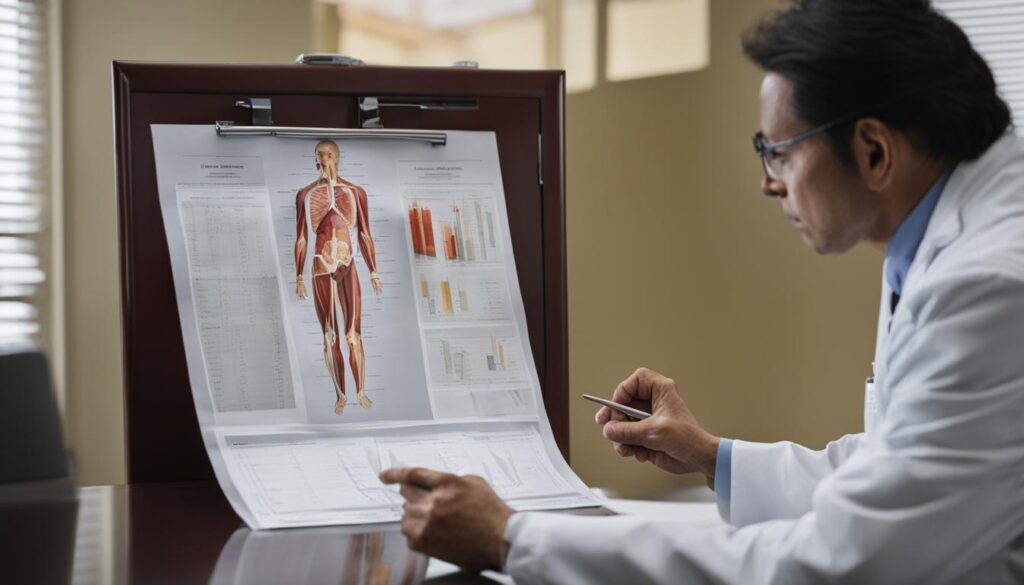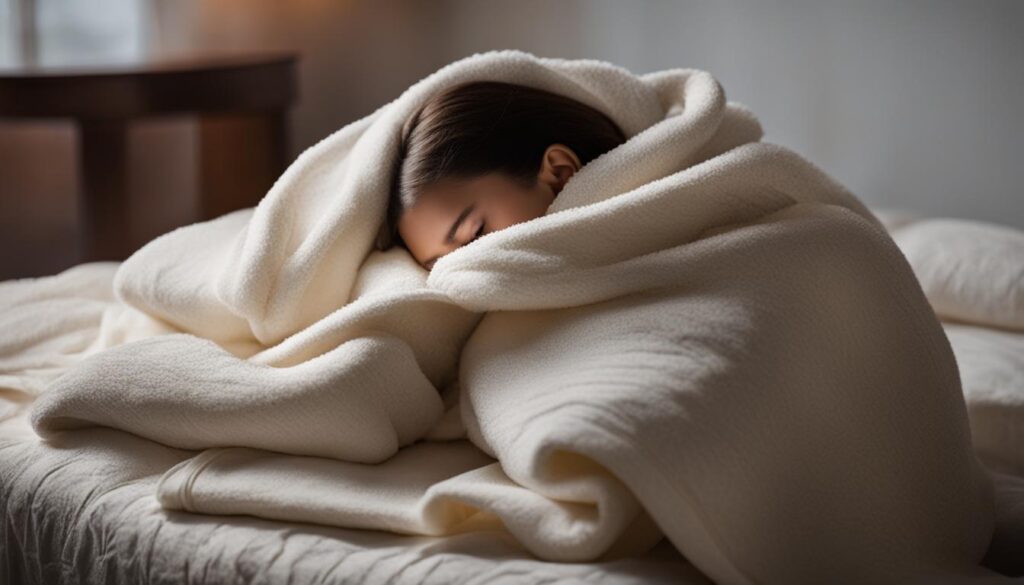If you’ve ever experienced the sudden and painful muscle contractions known as leg cramps at night, also referred to as charley horses, you know how disruptive they can be to your sleep. These cramps affect around 60% of people and can occur in anyone, but they are more prevalent in women and older adults. Although leg cramps at night are different from restless legs syndrome (RLS), they both involve uncomfortable sensations in the legs.
The exact cause of leg cramps at night is still unknown, but the condition can be attributed to various factors. Medications, pregnancy, dehydration, exercise, standing for extended periods, and alcohol consumption can all contribute to the occurrence of leg cramps. Despite the lack of a definitive cause, there are several strategies you can employ to prevent these cramps and improve the quality of your sleep.
Key Takeaways:
- Leg cramps at night, also known as charley horses, can disrupt sleep and affect around 60% of people.
- Leg cramps are more prevalent in women and older adults but can occur in anyone.
- Nocturnal leg cramps can be caused by factors such as medications, pregnancy, dehydration, exercise, standing for extended periods, and alcohol consumption.
- Preventive measures include staying hydrated, stretching or massaging the legs before bed, taking warm baths, and drinking pickle juice during a cramp episode.
- If leg cramps persist or worsen despite preventive actions, it is advisable to consult a healthcare professional to rule out underlying health issues.
Causes of Leg Cramps at Night
The exact cause of leg cramps at night is unknown, but several common factors can contribute to their occurrence. These factors can increase the likelihood of experiencing leg cramps and may vary from person to person. Understanding these causes can help individuals take necessary precautions to prevent or alleviate leg cramps. Some of the common contributors to leg cramps at night include:
- Medications: Certain medications such as diuretics, steroids, and antidepressants have been associated with nocturnal leg cramping. It is important to consult with a healthcare professional if you suspect that your medications may be causing leg cramps.
- Pregnancy: Pregnancy-related leg cramps are common and can be attributed to factors like a lack of blood flow in the veins or physiological changes during pregnancy. Pregnant individuals may experience leg cramps more frequently.
- Dehydration: Insufficient fluid intake throughout the day can lead to muscle cramps, including leg cramps at night. Staying hydrated is essential in preventing and reducing the occurrence of leg cramps.
- Extended periods of standing: Jobs or activities that require standing for long durations can increase the risk of leg cramps. Taking breaks, stretching, and incorporating regular movement can help alleviate the strain on the muscles.
- Excessive exercise: Overexertion or engaging in intense physical activities without proper warm-up and cooldown routines can lead to muscle fatigue and leg cramps.
- Alcohol consumption: Consuming alcohol can dehydrate the body and disrupt the balance of electrolytes, which may contribute to muscle cramps, including leg cramps at night.
It’s important to note that while leg cramps are generally harmless, frequent and persistent cramping should be evaluated by a doctor as it could indicate underlying health conditions such as cardiovascular disease, kidney disease, or nerve damage.
Comparison of Common Factors Contributing to Leg Cramps at Night
| Factors | Contributions to Leg Cramps at Night |
|---|---|
| Medications | Diuretics, steroids, and antidepressants have been associated with nocturnal leg cramping. |
| Pregnancy | Physiological changes and a lack of blood flow in the veins during pregnancy can lead to leg cramps at night. |
| Dehydration | Insufficient fluid intake can contribute to muscle cramps, including leg cramps at night. |
| Extended periods of standing | Standing for long durations can strain the leg muscles and increase the risk of leg cramps at night. |
| Excessive exercise | Intense physical activities without proper warm-up and cooldown routines can lead to muscle fatigue and leg cramps. |
| Alcohol consumption | Consuming alcohol can disrupt electrolyte balance and contribute to muscle cramps, including leg cramps at night. |

How to Reduce Leg Cramps at Night
There are several strategies that can help reduce the frequency and intensity of leg cramps at night. Staying hydrated throughout the day is important as dehydration can contribute to muscle cramps. Stretching or doing light exercises before bedtime, such as yoga, can help relax the muscles and reduce the chances of leg cramps. Taking warm baths with Epsom salt, which contains magnesium sulfate, can help alleviate muscle pain and potentially reduce leg cramping. Massaging the calves or feet before bed can also promote muscle relaxation. Some people find relief by walking on their heels during a leg cramp episode. If leg cramps persist or worsen despite these strategies, it’s advisable to consult a healthcare professional to rule out any underlying health issues.
| Strategies to Reduce Leg Cramps at Night | Description |
|---|---|
| Stay hydrated | Dehydration can contribute to muscle cramps. Drink plenty of water throughout the day to prevent leg cramps at night. |
| Stretch or exercise before bedtime | Perform light stretching exercises or engage in activities like yoga to relax the muscles and reduce the chances of leg cramps. |
| Take warm baths with Epsom salt | Epsom salt contains magnesium sulfate, which can help alleviate muscle pain and potentially reduce leg cramping when added to warm baths. |
| Massage the calves or feet | Massaging the calves or feet before bed can promote muscle relaxation and reduce the occurrence of leg cramps during the night. |
| Walk on your heels | Some individuals find relief by walking on their heels during a leg cramp episode. This can help alleviate the cramping sensation. |
Incorporating these strategies into your routine can significantly reduce leg cramps at night and improve your overall sleep quality. Remember to stay hydrated, stretch or exercise before bedtime, take warm baths with Epsom salt, and massage your calves or feet. If leg cramps persist or worsen despite these preventive measures, it’s advisable to consult a healthcare professional for further evaluation and guidance.
When to Talk to Your Doctor
In most cases, leg cramps at night are not a cause for concern. However, it is recommended to seek medical advice if the cramps persist or worsen and interfere with sleep or daily activities. Additionally, if leg cramps are accompanied by other symptoms or if there are underlying health conditions, it is important to consult a doctor. Some of the conditions that can be associated with leg cramps include cardiovascular disease, cirrhosis, kidney disease, osteoarthritis, narrowing of the spinal canal, nerve damage, and circulation disorders.
A doctor can evaluate the symptoms, conduct a physical examination, and order any necessary tests to determine the cause of leg cramps and provide appropriate treatment.

When to Seek Medical Advice for Leg Cramps at Night:
- If leg cramps persist or worsen and interfere with sleep or daily activities.
- If leg cramps are accompanied by other symptoms.
- If there are underlying health conditions.
| Underlying Health Conditions | Symptoms |
|---|---|
| Cardiovascular disease | Chest pain, shortness of breath, fatigue |
| Cirrhosis | Fatigue, jaundice, abdominal swelling |
| Kidney disease | Decreased urine output, swelling in legs and feet, fatigue |
| Osteoarthritis | Joint pain, stiffness, tenderness |
| Narrowing of the spinal canal | Back pain, leg pain, numbness or weakness in the legs |
| Nerve damage | Numbness, tingling, muscle weakness |
| Circulation disorders | Cold extremities, swelling, slow healing of wounds |
“Seeking medical advice is crucial when leg cramps persist or worsen. It allows doctors to identify underlying health conditions and provide appropriate treatment.” – Dr. Emma Thompson, MD
Natural Remedies for Leg Cramps at Night
In addition to the aforementioned prevention strategies, there are some natural remedies that may help alleviate leg cramps at night. These remedies can provide relief and contribute to a better night’s sleep. Here are some effective home remedies for nocturnal leg cramps:
- Hydration: Increasing water intake and maintaining proper hydration levels can help prevent muscle cramps. Dehydration can exacerbate leg cramps, so it’s important to drink an adequate amount of water throughout the day.
- Pickle Juice: Although the exact science behind it is not fully understood, drinking pickle juice during a leg cramp episode has been found to offer relief for some individuals. The high sodium content of pickle juice may help restore electrolyte balance and alleviate cramps. However, it’s essential to consult with a healthcare professional for personalized recommendations as excessive sodium intake may not be suitable for everyone.
- Stretching and Heat Therapy: Stretching the affected muscles before bed and using heat therapy can help relax the muscles and reduce the frequency of leg cramps. Applying a heating pad or taking a warm bath can provide soothing relief and promote muscle relaxation.
- Massage and Foot Flexing: Massaging the cramped muscles can help improve blood flow and reduce cramping. Additionally, flexing the foot gently can relax the muscles and alleviate leg cramps.
It’s important to note that the effectiveness of these natural remedies may vary for each individual. What works for one person may not work for another. It’s always advisable to consult a healthcare professional for personalized recommendations and guidance.
| Remedy | Benefits |
|---|---|
| Hydration | Prevents muscle dehydration and cramping |
| Pickle Juice | May restore electrolyte balance and provide relief for some individuals |
| Stretching and Heat Therapy | Relaxes muscles and reduces frequency of leg cramps |
| Massage and Foot Flexing | Improves blood flow, relaxes muscles, and alleviates leg cramps |
Implementing these natural remedies alongside preventive measures can significantly reduce the occurrence of leg cramps at night. However, if leg cramps persist or worsen despite these remedies, it’s important to consult a healthcare professional for further evaluation and guidance.
Conclusion
Leg cramps at night can be disruptive and uncomfortable, but there are several leg cramp prevention techniques and natural remedies that can help reduce their frequency and intensity. Staying hydrated throughout the day and maintaining a healthy lifestyle are important factors in minimizing leg cramps. Stretching or massaging the legs before bed, taking warm baths, and using heat therapy can also provide relief. Additionally, natural remedies such as drinking pickle juice and massaging the cramped muscles can help alleviate leg cramps.
However, if leg cramps persist or worsen despite these preventive measures, it is crucial to seek medical advice to rule out any underlying health conditions. Consulting with a healthcare professional can help determine the cause of the leg cramps and appropriate treatment options.
By implementing these tips for preventing leg cramps at night and incorporating natural remedies, individuals can improve their sleep quality and reduce the occurrence of leg cramps, ultimately leading to a more restful night’s sleep.
FAQ
What are the best ways to prevent leg cramps at night?
Some of the best ways to prevent leg cramps at night include staying hydrated, stretching or massaging the legs before bed, taking warm baths, and drinking pickle juice during a cramp episode.
What are the common factors contributing to leg cramps at night?
Leg cramps at night can be caused by various factors such as medications, pregnancy, dehydration, exercise, standing for extended periods, and alcohol consumption.
How can I reduce leg cramps at night?
To reduce leg cramps at night, it is recommended to stay hydrated throughout the day, stretch or do light exercises before bedtime, take warm baths with Epsom salt, and massaging the calves or feet before bed.
When should I talk to my doctor about leg cramps at night?
If leg cramps persist or worsen and interfere with sleep or daily activities, or if they are accompanied by other symptoms or underlying health conditions, it is important to consult a healthcare professional.
Are there any natural remedies for leg cramps at night?
Some natural remedies for leg cramps at night include increasing water intake, drinking pickle juice during a cramp episode, stretching the affected muscles, using heat therapy with a heating pad or warm bath, and massaging the cramped muscles.





